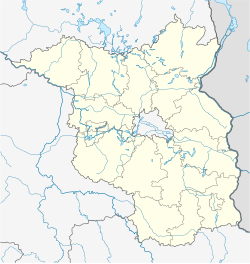Friesack
Appearance
Friesack | |
|---|---|
 Museum and library | |
Location of Friesack within Havelland district  | |
| Coordinates: 52°44′N 12°35′E / 52.733°N 12.583°E | |
| Country | Germany |
| State | Brandenburg |
| District | Havelland |
| Municipal assoc. | Friesack |
| Subdivisions | 2 Ortsteile |
| Government | |
| • Mayor (2024–29) | Lothar Schneider[1] (SPD) |
| Area | |
• Total | 83.67 km2 (32.31 sq mi) |
| Elevation | 35 m (115 ft) |
| Population (2022-12-31)[2] | |
• Total | 2,537 |
| • Density | 30/km2 (79/sq mi) |
| Time zone | UTC+01:00 (CET) |
| • Summer (DST) | UTC+02:00 (CEST) |
| Postal codes | 14662 |
| Dialling codes | 033235 |
| Vehicle registration | HVL |
| Website | www.amt-friesack.de |
Friesack (German pronunciation: [ˈfʁiːˌzak] ; also Friesack/Mark) is a town in the Havelland district, in Brandenburg, in north-eastern Germany. It is situated 22 km (14 mi) northeast of Rathenow, and 25 km (16 mi) southwest of Neuruppin. It is known for its Mesolithic archaeological site.

History
[edit]During World War II, in September 1943, the Oflag 8 prisoner-of-war camp was relocated from Frauenberg to Wutzetz, present-day district of Friesack.[3] Polish, Greek, Bulgarian and Romanian officers were held in the camp before its dissolution in April 1945.[3]
Film shot in Friesack
[edit]- 1923 : Die Schlucht des Todes (The Ravine of Death) directed by Luciano Albertini and Albert-Francis Bertoni
Demography
[edit]
|
|
|
Sons and daughters of the town
[edit]
- Emil Schallopp (1843-1919), chess master and writer
- Karsten Wettberg (born 1941), football coach
- Adalbert von Bredow (1814-1890), Prussian general
References
[edit]- ^ Landkreis Havelland Wahl der Bürgermeisterin / des Bürgermeisters. Retrieved 10 July 2024.
- ^ "Bevölkerungsentwicklung und Bevölkerungsstandim Land Brandenburg Dezember 2022" (PDF). Amt für Statistik Berlin-Brandenburg (in German). June 2023.
- ^ a b Megargee, Geoffrey P.; Overmans, Rüdiger; Vogt, Wolfgang (2022). The United States Holocaust Memorial Museum Encyclopedia of Camps and Ghettos 1933–1945. Volume IV. Indiana University Press, United States Holocaust Memorial Museum. pp. 211–212. ISBN 978-0-253-06089-1.
- ^ Detailed data sources are to be found in the Wikimedia Commons.Population Projection Brandenburg at Wikimedia Commons




